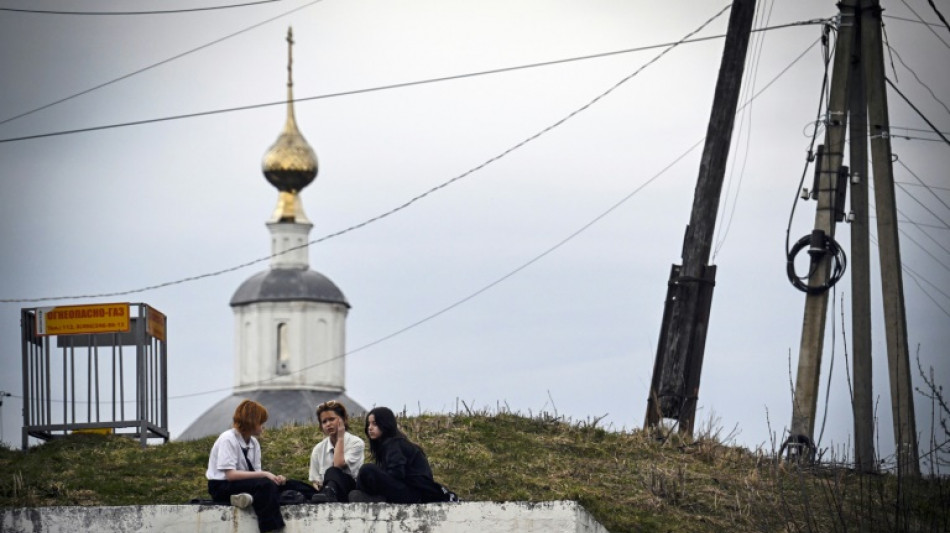
'We'll see': Russians outside Moscow have little faith in Trump

With its cobbled market square and gold-domed churches, the Russian town of Vereya bears few scars of the Ukraine offensive announced by President Vladimir Putin three years ago.
But even here, 600 kilometres (370 miles) from the front line and almost two hours drive from central Moscow, residents said an end to the fighting was long overdue.
In Vereya's cemetery, framed photographs of fallen soldiers lay nestled between flowers, while the flags of Russian military divisions fluttered in the wind.
Many in the town said they hoped US President Donald Trump's attempt to broker a ceasefire between Moscow and Kyiv would yield results, even if few had faith he would deliver.
"I would be very interested if Trump and Putin gathered and met together, discussed all the issues, shook hands, and closed this topic," 48-year-old cemetery worker Efim Semenikhin told AFP.
"Finally, there is hope that maybe this whole conflict will stop. And this really needs to happen."
Since returning to the White House in January, Trump has warmed ties with Moscow, reaching out directly to Putin in a stunning reversal of his predecessor Joe Biden's foreign policy.
The US leader has been pressuring both Ukraine and Russia to accept a ceasefire but has failed to make progress despite diplomatic efforts.
- Is Trump 'our man'? -
Hidden between green hills, Vereya loosely resembled an Alpine village with its tidy streets and brightly-painted houses, a touch of colour that gave it a festive feel.
The town of about 5,000 people makes flags, demand for which has soared over the three years of Moscow's military offensive, one local said.
Many ordinary Russians hoped Trump would end the fighting and ease tensions with Moscow, at their worst point since the Cold War.
But for some residents, peace seemed more uncertain than ever.
"Everything was so bad under Biden, and then Trump came and there seemed to be a turnaround and hope that in 2025 everything would finally be over," said 51-year-old museum worker Natalia.
"At one point I even began to think: what if Trump is really our man."
She said her hopes were dashed when Trump did not end the conflict "the same day" he returned to the White House, something the Republican had pledged to do.
"If it were so, he would have switched off Starlink," she said, referring to the Elon Musk-owned satellite internet network used by Ukrainian forces.
"He didn't. Trump is embarrassingly inconsistent. So I can't trust him," she added.
- 'I hope something will change' -
A local crane operator, Igor, told AFP that while Trump was better than Biden, peace was still "far away".
"How many promises were there from Trump, but nothing changes. Only words," the 65-year-old said.
Yelena Solodkaya, a mother of five, shared the same sentiment.
Surrounded by her large family, she said she tended "not to believe in politicians".
"No, no, on Trump, no," she said.
"These are politicians, not ordinary people, they are different," Solodkaya, who moved from the southern Ukrainian city of Mykolaiv in 2014, said.
According to a recent Levada Center poll, three out of four Russians would support Putin "if he decided to end the military conflict with Ukraine this week."
At a local cafe, 20-year-old waitress Alisa was more optimistic.
"What I heard on the news is that there were talks between Putin and Trump -- and they were very successful, I think," she said.
"And I think we're going to do very well because of that."
Her employer -- called "Stories" -- serves up burgers and Coca Cola -- American fast food staples that are still popular in Russia, despite sanctions and anti-American sentiment.
"I hope something will change after these negotiations," she said.
She said she hoped for peace, as well as for companies like McDonald's to return -- the US fast food giant left Russia in the wake of Moscow's offensive.
"I would like the same McDonald's to come back. So that everything would be called as it was before. That is, nothing has changed, so that everything remains as it was!"
On a bridge crossing the local river, Semenikhin was less certain.
"We'll see what happens."
W.Phillips--TNT